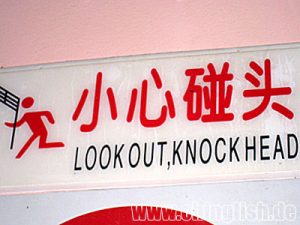Chinglish is a portmanteau of the words Chinese & English and refers to either spoken or written English which is influenced by Chinese. Chinglish, which is sometimes called “Chinese English” or “China English”, is the combination of Chinese grammar & English vocabulary.
The origin of Chinglish can be dated back to the mid 17th century when British traders arrived in Southern China. The British and Chinese traders, due to the communication gap, used Chinese pidgin English for their business. Although, later standard English was begun to be taught in China’s education system, Chinese pidgin English couldn’t be eradicated and evolved to take the form of what is now popularly known as Chinglish.
So, what’s the reason behind the existence of Chinglish? The main reason is found to be complexity. Chinese is a very complex language. In fact, it is considered the most complex language of all. So exact & accurate translation of Chinese is a really difficult task. Here’s an example for how difficult Chinese translation can get.
“Yun Zhi Jue Zhong”
The correct translation of this Chinese sentence is
“The way of heaven is profound & mysterious & the way of mankind is difficult. Only if we make a precise & unified plan & follow the doctrine of the mean, can we rule the country well.”
Let’s analyze the figures here. The Chinese sentence has 4 words and the English translation has 37 words. It’s nearly in the ratio of 1:9.If we count the syllables, the Chinese sentence is 4 syllabled while the English translation is composed of 52 syllables. Thats 1:13.
Shocking! right?This shows the complexity of Chinese language and how can we expect ordinary people to make these sorts of translation. This leads to mistakes in translation giving rise to Chinglish.
Confusion is created in translation due to different connotations for same denotation. Verbs like see, watch, read and look have the same word ‘kan’ in Chinese. So “I’m watching a movie” is incorrectly translated as “I’m looking a movie”. Similarly, “Turn on the door” for “Open the door” and “Can you say Spanish” for “Can you speak Spanish”.
Another reason behind the existence of Chinglish is quite interesting. The reason is ‘humor’.The young generation, though realizing the mistakes, find Chinglish interesting and humorous. So they continue using it. They select vocabularies to rhyme their phrase rather than the proper usage.
The linguists say the birth of Chinglish is due to “psychological structure latent in the brain” which Is activated when one attempts to learn a second language. There are several other examples of inter-language like Franglais for French English, Hinglish for Hindi English, Spanglish for Spanish English and many more.
References:
“Chinglish: an illustrated lecture”
by Dr. William Griffin, Associate Professor of Anthropology, St. Charles Community College
http://en.wikipedia.org/wiki/Chinglish
Some examples of Chinglish Signs




4 responses to “Chinglish चिङ्ग्लिस्”
wow…aba ekdin Chinglish bolera sunau hai ta…
maile examples dekhai hale ni
chinglish ta chinese le matra bolchha.hami ta nepanglish bolne
“âYun Zhi Jue Zhongâ
The correct translation of this Chinese sentence is
âThe way of heaven is profound & mysterious & the way of mankind is difficult. Only if we make a precise & unified plan & follow the doctrine of the mean, can we rule the country well.â ”
That’s amazing. We deal with a lot of Chinese documentation at work and we always have to bring in a translation agency, the language is just so complex. I was talking to a friend about the language recently and she was telling me how the symbol for “love” incorporates that symbol for “heart”. I find that such a beautiful idea.
Also, I saw a picture online of a sign saying something along the lines of “Young, tender grass. How hard-hearted to trample it.” I’m guessing that means “Keep off the grass” and I’ve never seen it expressed so eloquently before. 🙂
Itâs actually a nice and helpful piece of info. Iâm glad that you shared this helpful info with us. Please keep us up to date like this. Thanks for sharing.